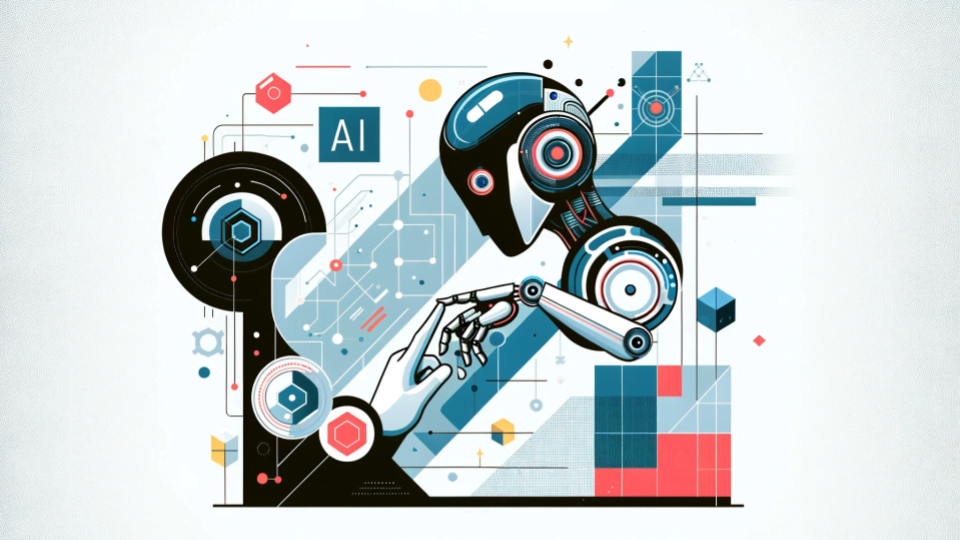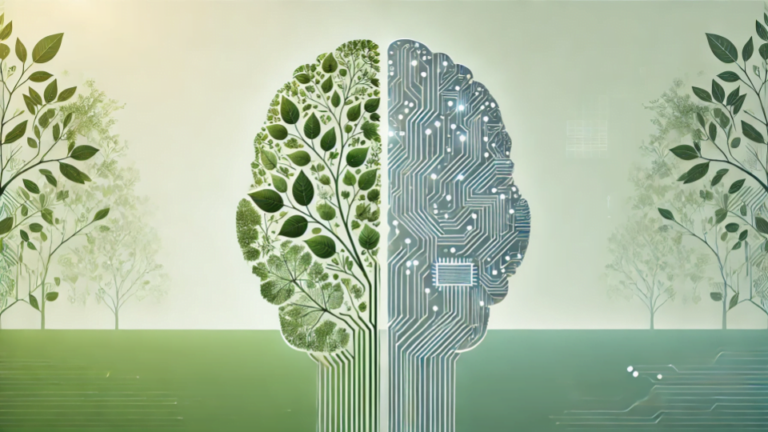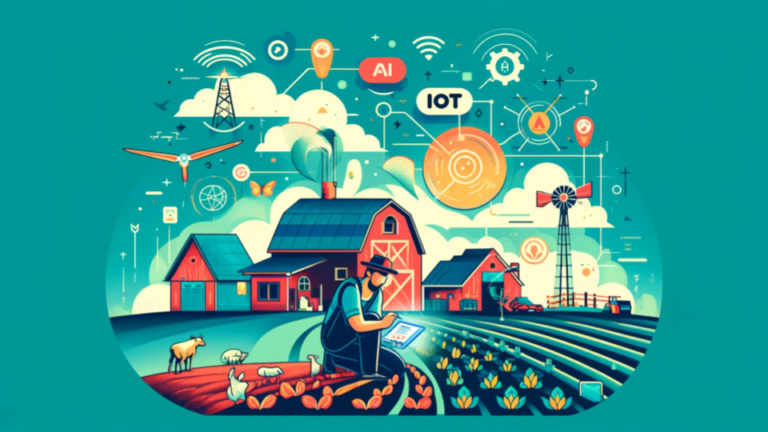The “What is What” of Artificial Intelligence (AI)
Artificial Intelligence (AI) is revolutionizing various sectors, propelling innovations from automated customer service to advanced disease diagnosis. This technology enables machines to replicate human intelligence, enhancing efficiency and capabilities across industries.

Artificial Intelligence allows machines to perform tasks that typically require human intellect such as recognizing speech, interpreting complex data, making decisions, and translating languages. The journey of AI began in the mid-20th century but has roots in ancient myths of mechanical beings. Notably, the mid-1900s saw pivotal developments, including Alan Turing’s work, which laid the groundwork for modern AI by proposing that machines could simulate human thinking.
The AI industry has experienced remarkable growth, underscored by a McKinsey report which highlights a major surge in AI adoption, notably in generative AI applications across various business sectors. By 2030, the AI market is expected to reach a valuation of approximately $1.25 trillion. Organizations that excel in AI implementation—AI high performers—attribute a significant portion of their profits to AI innovations, with some reporting that AI contributes to 20% of their EBIT (AI in 2023 | McKinsey).
AI’s role extends beyond commercial applications to environmental sustainability. Approximately 43% of organizations employ AI to enhance their sustainability initiatives, such as improving energy efficiency and reducing waste.
Despite its benefits, Artificial Intelligence deployment raises significant ethical and operational challenges, including concerns over privacy, bias, and the need for effective risk management. Addressing these challenges is crucial to harness AI’s full potential while ensuring it is used responsibly and ethically (AI in 2023 | Venture Kites).
How Artificial Intelligence Works?
Understanding how artificial intelligence (AI) operates involves exploring the key components and processes that enable machines to perform tasks that typically require human intelligence. Here’s a breakdown of the core mechanisms that power AI:
Core Mechanisms of AI
- Machine Learning (ML): At the heart of Artificial Intelligence is machine learning, which allows machines to learn from data and improve over time without being explicitly programmed. This is achieved through algorithms that adjust and refine models based on input data and desired outcomes. For example, AI systems use ML to optimize energy efficiency in sustainability efforts, as seen in 43% of organizations focusing on AI-driven environmental impacts (Artificial Intelligence | Precedence Research).
- Deep Learning (DL): A subset of machine learning, deep learning utilizes layered neural networks to analyze vast amounts of data. These networks mimic the human brain’s structure and function, enabling complex decision-making and pattern recognition. The advancements in deep learning have been pivotal, especially with models that have many layers, significantly enhancing the capabilities of AI systems.
- Natural Language Processing (NLP): NLP enables machines to understand and interact using human language. This technology underpins chatbots, translation services, and voice-activated assistants, making AI increasingly accessible and functional in everyday applications.
- Robotics and Automation: Integrating AI with robotics has led to the development of machines that can perform tasks ranging from assembly line work to complex surgeries. Innovations in robotics often use AI for spatial awareness, decision-making, and learning from environmental interactions.
- Ethical and Secure AI Deployment: As AI technologies become more embedded in critical sectors, managing risks related to privacy, equity, and fairness becomes crucial. High-performing organizations in AI adoption are more proactive in engaging in practices known to mitigate these risks, such as enhancing data governance and standardizing AI processes.
Expanding Applications and Challenges
AI’s application is expanding rapidly across various domains. Organizations leading in AI adoption report significant benefits in areas like marketing, sales, and product development. These leaders not only invest more in AI but also align their AI strategies with business outcomes to maximize returns (Notable Indian AI Startups | Venture Kites).
However, the journey of AI integration is not without challenges. Issues such as data bias, security vulnerabilities, and the ethical use of AI continue to be areas of concern. Addressing these challenges is essential to harness AI’s full potential while ensuring it contributes positively to society (What is AI? | McKinsey).
In essence, AI works by combining advanced algorithms, vast data sets, and continuous learning mechanisms to perform tasks that would typically require human intelligence. As AI continues to evolve, it holds the promise of driving significant advancements across all facets of life and industry.
Types of AI
Artificial Intelligence can be broadly classified into several types based on capabilities and functionalities. Understanding these types helps in grasping how AI is tailored to various applications, from simple tasks to complex problem-solving scenarios.
Based on Capabilities
- Narrow AI: Also known as Weak AI, Narrow AI is designed to perform a narrow task (e.g., facial recognition or internet searches). It operates under a limited set of constraints and does not possess genuine intelligence or consciousness. Most AI used today, like chatbots and recommendation systems, falls into this category.
- General AI: Artificial General Intelligence (AGI) represents machines that can understand, learn, and apply knowledge across different tasks, mimicking human intelligence. AGI can solve a variety of problems with the same efficiency as a human. This type of AI is still theoretical and not yet realized.
- Superintelligent AI: This form of AI surpasses human intelligence and ability across a wide range of activities, including creative, emotional, and social intelligence. Superintelligence is a concept that lies in the future and poses both exciting possibilities and significant risks.
Based on Functionality
- Reactive Machines: These are the simplest forms of AI and do not have the capability to form memories or to use past experiences to inform current decisions. An example is IBM’s Deep Blue, which beat Garry Kasparov in chess.
- Limited Memory: This type of AI can make informed and improved decisions by studying past data from its short-term memory. Self-driving cars use this AI to make immediate decisions, like changing lanes, based on the ongoing traffic conditions as well as vast data from past experiences.
- Theory of Mind: While still in development, this AI would fundamentally understand human emotions, beliefs, needs, and be able to interact socially. Its development marks a significant leap towards machines that can comprehend human intentions.
- Self-aware AI: This is the ultimate level of AI development, which would have its own consciousness, sentiments, and self-awareness. Self-aware AI is purely speculative at this stage and a subject of many ethical debates.
Each type of AI has its unique set of capabilities and serves different purposes. While Narrow AI is already widely used in various applications, the other types are progressively being researched and developed. Understanding these types not only helps in identifying current applications but also in anticipating future developments in AI technology.
Core Technologies of Artificial Intelligence
Artificial Intelligence (AI) relies on several core technologies to enable machines to perform tasks that typically require human-like intelligence. Here’s a detailed look at each of these technologies:
Machine Learning (ML)
Machine Learning is the backbone of Artificial Intelligence, enabling systems to learn from data and improve over time without explicit programming. It encompasses various techniques, including supervised learning, where the system learns from labeled data, and unsupervised learning, which involves learning from unlabeled data to identify patterns.
Neural Networks
A subset of machine learning, neural networks are designed to mimic the human brain’s architecture and function. They consist of layers of nodes, or neurons, which process and transmit information. Neural networks are fundamental to deep learning applications, such as image and speech recognition, where they help in interpreting complex inputs.
Deep Learning
Deep Learning is an advanced form of machine learning involving neural networks with many layers, hence “deep.” These networks excel at processing large sets of data and identifying intricate patterns, making them suitable for complex tasks like natural language processing and autonomous driving. Deep learning reduces the need for human intervention by automating the feature extraction process, allowing for more sophisticated and efficient learning from large amounts of unstructured data.
Natural Language Processing (NLP)
NLP enables machines to understand and interpret human language, allowing for interactions between humans and machines using natural dialogue. The technology uses both machine learning and deep learning to translate text into data that the machine can process and respond to. It powers applications like chatbots, translation services, and voice-activated assistants.
Robotics
Robotics integrates AI with mechanical devices to perform tasks automatically. Artificial Intelligence in robotics allows robots to learn from their environment, adapt to new tasks, and perform complex operations. This includes everything from industrial robots in manufacturing to autonomous vehicles in transportation.
Each of these technologies plays a crucial role in the development and deployment of AI systems, shaping the future of how machines learn, interpret, and interact with the world around them. As AI continues to evolve, the interplay among these technologies will undoubtedly lead to more advanced and seamless integration in various aspects of daily life and industry operations.
The AI Market Overview
The artificial intelligence (AI) market is undergoing significant expansion and transformation, with a strong growth trajectory and widespread adoption across various industries.
Market Size and Growth
The global AI market was valued at approximately $515.31 billion in 2023 and is projected to grow to $621.19 billion in 2024. By 2032, it is expected to reach an astounding $2,740.46 billion, representing a compound annual growth rate (CAGR) of 20.4% during the forecast period from 2024 to 2032 (Fortune Business Insights). This growth is propelled by the increasing adoption of cloud technologies and the integration of AI across different sectors including telecommunications, healthcare, and financial services.
Industry Adoption
Artificial Intelligence technology is becoming integral to various business functions, contributing significantly to sectors like manufacturing, where it is projected to add $3.78 trillion by 2035. In telecommunications, 52% of organizations are utilizing AI to enhance productivity, particularly through the use of chatbots. The financial sector also sees substantial benefits, with AI expected to add $1 billion to industry revenue by 2035 (AI Statistics | Exploding Topics).
Regional Insights
North America currently leads the AI market, largely due to the presence of major technology firms and their continuous innovation and development in AI technologies. Asia Pacific is anticipated to record the highest CAGR in the coming years, driven by increased investments and the rapid adoption of advanced technologies.
Competitive Landscape
Major players like Microsoft Corporation, Amazon.com, Inc., and Google LLC are at the forefront of AI development. These companies are not only enhancing their technologies but also forming strategic partnerships and expanding their market presence globally (AI Market | Fortune Business Insights).
Future Outlook
The AI market is set to revolutionize numerous aspects of everyday life and business operations, driving efficiencies and creating new opportunities for growth and innovation. As the technology evolves, so does the market landscape, with companies continuously adapting to new developments and increasing their investments in AI capabilities.
This dynamic growth and integration of AI highlight its potential to significantly alter how businesses operate and interact with customers, underscoring the importance of staying updated with technological advancements to maintain competitive advantage.
Applications of AI
Artificial Intelligence (AI) is transforming a broad spectrum of industries by automating complex tasks, enhancing data analytics, and improving service delivery. Here are some of the key applications of AI across various sectors:
- Healthcare: AI is revolutionizing healthcare by improving diagnostic accuracy, personalizing treatment plans, and managing patient care more efficiently. AI systems analyze large datasets to identify patterns that humans may overlook, helping in early disease detection and tailored treatment strategies.
- Manufacturing: In manufacturing, AI enhances operational efficiency through predictive maintenance, quality control, and supply chain management. AI algorithms predict machine failures before they occur, minimizing downtime and maintenance costs. They also optimize manufacturing processes by analyzing real-time data from production lines .
- Retail: AI is used in retail to personalize shopping experiences and optimize inventory management. By analyzing customer data, AI can predict purchasing behavior and recommend products tailored to individual preferences. It also helps retailers maintain optimal stock levels by predicting future demand trends.
- Finance: In the financial sector, AI detects fraudulent transactions and automates routine tasks like data analysis and customer service. AI systems can analyze transaction patterns to identify anomalies that may indicate fraud, enhancing security measures.
- Transportation: AI improves transportation efficiency through autonomous vehicle technology and route optimization. Self-driving cars, equipped with AI, interpret sensory information to safely navigate without human input. AI also optimizes shipping routes to reduce delivery times and fuel consumption.
- Telecommunications: AI enhances network management and customer service in telecommunications. It predicts network failures, optimizes traffic distribution, and provides personalized customer support through intelligent virtual assistants.
These applications demonstrate AI’s capability to drive innovation and efficiency across various fields, making it a crucial technology for the future. The integration of AI helps businesses reduce costs, increase accuracy, and deliver superior customer experiences. As AI technology continues to evolve, its impact across these industries is expected to grow, offering even more advanced solutions to complex challenges (Adopting AI | McKinsey & Company).
Challenges and Ethical Considerations of AI
The rapid advancement of artificial intelligence brings a host of ethical challenges and considerations that need careful management. Here are some of the key issues:
- Bias and Fairness: AI systems can perpetuate or even exacerbate existing biases if they’re trained on non-representative data. Ensuring fairness involves careful curation of training datasets and the development of algorithms that can detect and correct bias. Ethical AI must strive to treat all users fairly, regardless of race, gender, or other characteristics.
- Explainability and Transparency: There’s a growing demand for AI systems to be transparent and explainable. This means that decisions made by AI should be understandable by humans, and the processes leading to those decisions should be accessible and clear. This is crucial not only for trust but also for diagnosing and correcting issues in AI behaviors.
- Privacy and Data Ethics: AI systems often require vast amounts of data, which can include sensitive personal information. Ensuring that this data is collected, used, and stored responsibly is paramount. This involves securing informed consent for data use, implementing robust data protection measures, and maintaining the confidentiality and integrity of data.
- Human Oversight and Accountability: Despite AI’s autonomy, it’s crucial that there is a human “in the loop” who can oversee and intervene in the decisions made by AI systems. This ensures that AI operates within ethical bounds and that there’s accountability for the outcomes of AI decisions.
- Security: As Artificial Intelligence systems become more integral to operations across sectors, their security becomes paramount. Protecting AI systems from hacking and ensuring that they cannot be manipulated is critical to maintaining their integrity and the safety of their outputs.
- Sustainability: The environmental impact of training and running AI systems, especially large models, is a significant concern. Sustainable AI involves considering the energy consumption and environmental footprint of AI systems and looking for ways to mitigate this impact.
Addressing these challenges involves a multidisciplinary approach, combining insights from technology, law, ethics, and social sciences to ensure that AI develops in a way that benefits society and minimizes harm. Organizations are increasingly adopting frameworks and guidelines that promote ethical AI by integrating these principles into the development and deployment of AI technologies.
The Future of AI
The future of artificial intelligence (AI) promises transformative changes across various sectors, driven by rapid advancements and strategic implementations. Here’s a look at some anticipated developments and their implications:
- Generative AI: As one of the most exciting frontiers, generative AI is expected to significantly alter content creation across media, including text, images, and video. This technology will continue to enhance creative processes and generate innovative solutions in fields ranging from marketing to entertainment.
- AI in Business Functions: High-performing organizations are increasingly embedding AI into core business functions such as product development, risk management, and supply chain operations. This integration aims to enhance productivity, foster innovation, and create new revenue streams.
- Advanced AI Models and Applications: Smaller, more efficient AI models are becoming crucial due to rising cloud computing costs and hardware limitations. These models are tailored for specific, localized applications, enabling businesses to deploy AI more strategically and effectively.
- AI and Sustainability: AI is set to play a critical role in environmental sustainability. This includes leveraging AI for managing natural resources more efficiently, enhancing energy efficiency, and tracking environmental changes. Initiatives like the geospatial AI model developed by IBM and NASA exemplify efforts to use AI for climate and earth science applications.
- Ethics and Safety: As AI becomes more pervasive, the emphasis on ethical frameworks and safety protocols will intensify. Organizations are forming alliances to establish standards that ensure AI is developed and used responsibly, emphasizing security, transparency, and fairness.
- Multimodal AI: The integration of various forms of data input (text, visual, audio) into AI systems is expected to enrich user interactions and provide more nuanced and context-aware responses. This development could revolutionize customer service, healthcare diagnostics, and many other sectors.
- AI Governance and Regulation: With AI’s growing influence, regulatory frameworks are being crafted to manage its deployment and ensure it benefits society. Such regulations will address issues of privacy, bias, and transparency, shaping how AI is utilized globally.
These trends illustrate a future where AI not only augments human capabilities but also challenges us to rethink our interaction with technology and its role in society. The potential of AI is vast, and its prudent, innovative application will likely define the next era of technological advancement.
Conclusion
Artificial Intelligence (AI) is reshaping our world, influencing a multitude of industries with its vast capabilities. As we have explored, AI extends from enhancing healthcare diagnostics and treatment plans to revolutionizing manufacturing processes and elevating customer experiences in retail. The impact of AI is profound, driving innovations that are not only streamlining operations but also creating new opportunities for growth and advancement.
However, the journey of integrating AI into our daily lives and business practices comes with significant challenges. Issues of bias, ethical use, and privacy remain at the forefront of AI deployment. Ensuring that AI systems operate fairly and transparently is crucial for their acceptance and effectiveness.
Looking ahead, the future of AI is filled with potential. With advancements in technologies like generative AI and multimodal applications, AI is set to offer even more sophisticated solutions that promise to enhance our capabilities and improve life in countless ways. Moreover, the commitment to ethical AI practices and the development of global regulations will play pivotal roles in shaping a future where AI contributes positively to society and mitigates potential risks.
As we continue to navigate the complexities and opportunities presented by AI, it is clear that this technology is not just a tool of the present but a foundational element for the future. The ongoing evolution of AI demands our attention, creativity, and vigilance to harness its full potential while ensuring it serves the greater good.
Creative Head – Mrs. Shemi K Kandoth
Content By Dork Company
Art By Dork Company
100 Startups by IIT Madras in 2024: A Landmark Entrepreneurial
IIT Madras, a leader in India’s education and research, embarks on an ambitious journey. In…
Inside Indie Hackers: How a Transparent Community of Founders is
Indie Hackers, established in 2016 by Courtland Allen, is a thriving online community and resource…
Cursor: How 4 MIT Graduates Built the Fastest-Growing AI Startup
Cursor, an AI-powered integrated development environment (IDE), emerged in 2022 as one of the fastest-growing…
Vercel: This Startup Is Quietly Powering the Internet — And
Founded in 2015 by Guillermo Rauch and Naoyuki Kanezawa, Vercel—originally known as Zeit—set out to…
Tella: How This Tiny Team Is Revolutionizing Screen Recording
Tella is a modern screen recording platform built for today’s content creators and video professionals….
CarDekho: How Two IIT Brothers Changed The Way India Bought
CarDekho, a prominent name in the Indian automotive industry, has revolutionized the way people buy,…
Kovai.co: The Startup That Gave ₹14 crore To Its 140
The idea for Kovai.co started when Saravana Kumar, the CEO, was working as a software…




















Leave a Reply
You must be logged in to post a comment.